Alan Baxter's Blog, page 98
October 24, 2010
I love a bit of hippy kak
It's true, I can't deny it. I love markets with stalls selling all kinds of old kak. I love festivals where you get the inevitable stalls of tie-dye and incense and models of elves nursing tiny dragons. And I love towns like Berry, not far from where I live, that has shops full of hippy kak. Pendants and tarot decks, angels and fairies, colourful clothes and bags with OMs on them. You can find these awesome pressed leather notepads, with funky Celtic designs tooled around the edges. I saw some today with dragons on them, that would have been awesome except the dragons were upside-down. Or the book was from Asia, maybe…
But it is a slice of fantasy to explore shops like that. It's both ridiculous and charming. One thing today that did make me laugh was this. In a cabinet of "Genuine Magickal Amulets" (by which I question their use of the word genuine) I saw this:
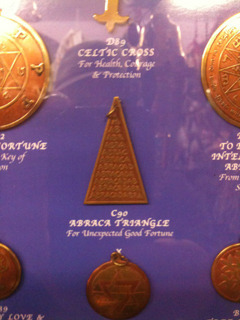
In case it's hard to read, it says that this is an "ABRACA TRIANGLE" and it's "For Unexpected Good Fortune". Now, call me cynical, but if you bought that pendant, and it worked, then any good fortune would hardly be unexpected. Unless you didn't expect the pendant to work, then got some good fortune. Or perhaps… you see my problem with this particular bit of hippy kak.
Then again, it's in the same store that sells this bumper sticker:
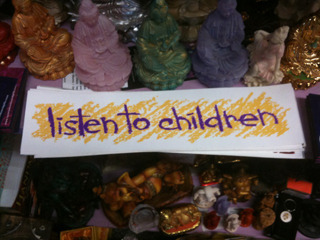
So they clearly have no fucking idea what they're talking about. Listen to children? Everything would be mad if we listened to kids.
Still, I do love a bit of old hippy kak nonetheless.
.
October 22, 2010
The physical brutality of being a writer
For some months now I've had a patch of sore skin on my left elbow. It's sort of rough and tender and gets a bit scaly from time to time. My wife suggested that maybe it was a part of me that got extra dry and that I should start moisturising it. Of course, I never did. Not through any particular reluctance to use moisturiser. Rather through pure male laziness, where thoughts of moisturiser just don't enter my head, even during my time in the bathroom.
But this morning I had a revelation. A moment of realisation. "Eureka!" I cried. Actually, I didn't cry eureka at all. I kinda went, "Oooooh, that's what it is."
I realised today that I always sit a certain way. I have this cool office chair – it's leather and it swivels and leans back and all that stuff. It makes me feel very important. It also has these hard plastic arms with a rough, stippled finish. And I always sit back with my right hand on the mouse while leaning heavily on my left elbow when I'm reading online. And I read a lot online. That heavy leaning has been slowly but surely rubbing against my elbow and eventually led to that ongoing rough and sore patch of skin.
So now I have to decide whether or not to wear elbow patches while I'm working. Or perhaps I could cover the arms of the chair in something soft and caring, perhaps the smooth hide of a young deer stretched over lamb's wool. I know better than to think I can stop the leaning habit.
I regularly stretch and move around, often get up and do some exercise in between long writing and reading sessions, yet every time I sit back down I unwittingly abuse my left elbow.
There's nothing else for it. I'm off to hunt down and skin a fawn.
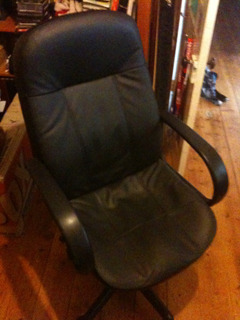
This is the chair in question. Notice Penry lying outside the door. That face says, "Dude, why are you photographing your chair? Tale me to the beach already."
.
October 21, 2010
Book Depository – free shipping worldwide
 I want to make sure that everyone knows about this latest online book store called Book Depository. Why is it so special? How does great prices and free worldwide shipping grab you?
I want to make sure that everyone knows about this latest online book store called Book Depository. Why is it so special? How does great prices and free worldwide shipping grab you?
Online bookstores are fast becoming the preferred shopping venue for book buyers, especially here in Australia. We're very lucky to live in such an awesome place and one of the blessings is our geographical remove from the rest of the world. That same thing is also our biggest hurdle in other instances, especially book buying. Book prices in Australia are generally high – a regular paperback is usually around the AU$20 mark in most bookstores.
You can get much better prices from somewhere like Amazon, but the downside is that we pay high shipping rates – remember that geographical remove I mentioned? That means that you tend to pay cover price for a book, then at least the same again in postage, which spanks the better price you can find online.
Enter Book Depository. This place charges excellent prices for books and ships free worldwide. That means that even here down under we can find great prices on books. Let's use my own books as a quick example (and a little shameless self-promotion). Currently, the Australian and US dollars are of almost equal value.
RealmShift:
Australia domestic price: AU$19.95 (shipping inc. within Australia).
Amazon.com: AU$10.64 + AU$10.64 shipping = AU$21.28
Amazon.co.uk: £7.99 + £8.78 shipping = AU$28.52
Book Deposity: AU$9.17 with free shipping = AU$9.17
MageSign:
Australia domestic price: AU$19.95
Amazon.com: AU$10.64 + AU$10.64 shipping = AU$21.28
Amazon.co.uk: £7.99 + £8.78 shipping = AU$28.52
Book Deposity: AU$9.17 with free shipping = AU$9.17
So, the advantage is clear to see. Less than half price from Book Depository, even when they ship to Australia.
I don't know how long Book Depository will last. They're presumably cutting into their retail discount (which is usually at least 35% of cover price) to absorb shipping costs. I guess the idea is that their margin will be much slimmer, but their oversales figures much higher, hence a successful business model. The idea works for me! So, next time you're looking to buy books, double check the pricing at Book Depository and see if they're cheaper. If they are, buy from them and hopefully they'll survive and prosper to continue bringing us books at great prices.
NB: There's a .com and a .co.uk version of Book Depository that I checked for this post. For me, here in Australia, the .com page supplied the better price by around a dollar a book.
.
Video interview with Joanna Penn of The Creative Penn
I was recently interviewed by Joanna Penn of The Creative Penn about all things dark fantasy, genre fiction and thrillers. We chat about my books, about writing thrillers and what defines a genre. We also discuss violence, mythology, research and travel, podcast and my new ThrillerCast with David Wood. There's also an exclusive mention of the working title of my next book. It's a bit over 12 minutes long. Hope you enjoy it.
.
Is fantasy really escapism?
Of course it is, but is it the most escapist? A recent blog post by Anne Hamilton (which was part of Helen Lowe's blog tour for the launch of The Heir Of Night) got me thinking about this subject again. In that post, Anne says:
When I was growing up, SFF was generally derided as 'escapist'. I've come to the conclusion that 'realistic' fiction is far more deserving of that title. It's ephemeral and transient, rarely lasting to the end of a decade. It doesn't transcend its own culture or time or deal with anything beyond the superficial. However the best of SFF – fantasy, in particular – engages in a struggle with name and thus with identity and destiny.
That's a great quote. But how accurate is she? I'd suggest that she's revealed a rarely considered truth.
She says that non-genre fiction, or 'realistic' fiction as she calls it, is "ephemeral and transient, rarely lasting to the end of a decade". It's true that non-genre fiction, slice of life stories, often date very quickly. But I dispute that that makes them any less relevant. Take a classic like To Kill A Mockingbird by Harper Lee as an example. That book is a masterpiece, a beautifully crafted story with fantastic characters. Pretty much everything about it is still relevant today and it explores some very important concepts. I don't think a book like that is transient or short lived. I do think it's escapism though, however much it makes us look at ourselves and question how we might react in a similar situation.
Other non-genre work might date and age more quickly, becoming largely irrelevant beyond an interesting peek into days gone by. Science fiction, however, is way more likely to date very quickly. At the speed of technological advancement we're currently experiencing, you can start writing a sci-fi novel and the concept is no longer sci-fi by the time you type "The End".
So why am I suggesting that Anne Hamilton is right? Most non-genre fiction is looking at the trials and tribulations of people whose lives are very similar to our own. They live in the same world, the same time, more or less, and have similar concerns. When we read about those lives it's pure escapism because those people aren't us. We might wonder what we'd do in a similar situation, but that's about it.
When you start to look at SFF, particularly fantasy, you open up doors not available in contemporary non-genre fiction. You get to explore the human condition within a mythic framework where anything goes. As much as stories like this are the wildest kind of escapism, they also serve to hold a mirror up to humanity as a whole. While a story about a white suburban family's social wranglings might make a white suburban reader consider their own life, a good science fiction story will make us consider humanity as a species. Good SFF takes us on a journey not only of personal exploration but beyond ourselves to our culture and identity.
Of course, non-genre fiction can do these things too, but nothing does it so well or with as much scope as SFF.
Ever since people could speak they told stories. Stories about real people was gossip. Stories about life were myths. Myths are the original fantasy epics. Every race has its creation myths – these great mysterious stories from beyond the human, trying to answer the massive questions about why we're here and where we come from. Of course, just because we can ask those questions doesn't mean there's an answer. Religion is built on the concept that there's an answer for every question we can ask, and there's nothing more human than that kind of arrogance. And religion is just where people take a lucky dip of all the great myths and decide completely arbitrarily (though usually by birth) that one is the absolute truth while all the others are funny stories. Which is astounding. But I digress.
With mythology we can escape the boundaries of real life and explore those great big questions far more deeply than we ever can with non-genre fiction. That's what makes non-genre stuff pure escapism while fantasy is much more. SFF often addresses far bigger questions and concerns than non-genre fiction ever does. Of course, the lines are very blurred and all fiction is escapism. Good fiction is escapism that makes you think. Nothing makes you think more, in my opinion, than good SFF. As Anne Hamilton said, it "engages in a struggle with name and thus with identity and destiny".
Caveat: I know this is likely to be a fairly contentious post, with people citing many examples to back up one side of the argument or the other. Most arguments find their truths somewhere in the middle, but bring it on. Leave your comments with your thoughts. I've written this with a purely rambling mind while I thought about the subject and I'm very open to others' thoughts on it.
.
October 20, 2010
Writing the good fight- Guest post with Lorna Suzuki
A few times now I've run a workshop at conventions which is all about writing realistic fight scenes. Writers are constantly told to "write what you know" and good writers will research things they don't know very well. More accurately, writers should "write what you know, or have gone and found out about". I'm a writer and a martial artist. I've trained and taught martial arts for close to thirty years and had a variety of fighting experiences in a variety of tournament conditions, as well as a few encounters on the mean streets of life that are best not discussed on the public record. So I can be considered something of an expert on the subject.
I developed a workshop called Write The Fight Right, and it has been very well received each time I've run it. Here's the blurb:
This is a workshop designed to look at the things that make a fight scene in a story read as realistically as possible, while maintaining excitement and pace. By looking at the various factors that go into a real fight, paying attention to the things that we train for when we learn to fight, we can write fight scenes that stay exciting without breaking the rules of realism that shatter believability.
I've been asked by a few people to convert the content of the workshop into an ebook and sell it. I'm working on that, so bear with me.
 In the meantime, I have the pleasure of sharing some thoughts on the subject with author and martial artist Lorna Suzuki. Lorna is the author of The Imago Chronicles and has been studying and teaching martial arts for more than twenty-five years. As part of her blog tour promoting the 9th and last novel in the Imago series, as well as the release of her new YA book, The Magic Crystal (Book One of the Dream Merchant Saga), I asked her to chat with me about various aspects of writing fight scenes.
In the meantime, I have the pleasure of sharing some thoughts on the subject with author and martial artist Lorna Suzuki. Lorna is the author of The Imago Chronicles and has been studying and teaching martial arts for more than twenty-five years. As part of her blog tour promoting the 9th and last novel in the Imago series, as well as the release of her new YA book, The Magic Crystal (Book One of the Dream Merchant Saga), I asked her to chat with me about various aspects of writing fight scenes.
Lorna, welcome to The Word.
Thank you for hosting, Alan! I'm so happy to be here.
One of the first things I like to get out of the way when talking about fighting is the "Hollywood distraction". On film, fights need to be clear and visually spectacular. This often leads to each fighter taking a turn and a very unrealistic fight resulting. In writing, we can avoid the need for a visual spectacle and describe other aspects of a real fight. Lorna, what are your thoughts on this?
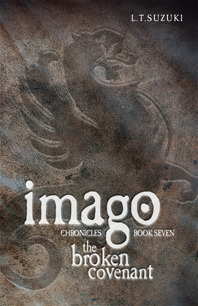 Unfortunately, I've been in real-life fight situations (with men, never against women) and for anyone who trains like we do, what you see on the screen is obviously choreographed and nothing like a real fight that can be over in a matter of seconds. From those who have struggled with writing these types of scenes and have read my fantasy series, one of the things they have consistently pointed out is that what makes mine so effective is that I tend to write about the emotional side of being caught up in a fight.
Unfortunately, I've been in real-life fight situations (with men, never against women) and for anyone who trains like we do, what you see on the screen is obviously choreographed and nothing like a real fight that can be over in a matter of seconds. From those who have struggled with writing these types of scenes and have read my fantasy series, one of the things they have consistently pointed out is that what makes mine so effective is that I tend to write about the emotional side of being caught up in a fight.
Also, because the vast majority of my readers do not train in martial arts, where practitioners can usually follow and understand what techniques are being applied, to write these scenes from a strictly technical perspective would only bore non-martial arts types out of their minds!
In my workshop, I always get people to pair up and we go through a few really basic drills to demonstrate range, footwork and movement from a real fighting perspective. How do you approach this aspect of fighting in your writing?
Definitely, having an understanding of how the body moves, the importance of balance, of not over-extending punches and kicks, etc. is intrinsic to writing scenes that have a realistic slant to them. After training/instructing for so many years, these scenes tend to play out in my head. I think having a background in martial arts makes it possible to allow the characters to do what they must to survive the situations I place them in. Of course, as I already know what each character's weaknesses and strengths are, it's easy to have these fight scenes unfold in my mind's eye. For me, it is almost like transcribing what I see and trying to capture the emotional toll such a confrontation can have on the character.
I also like to point out that when a fight is written with a lot of clinical terminology, it takes the reader out of the visceral experience of fighting. If you need to describe techniques in detail it slows the pace of a part of the book that should be fast and hectic. How do you avoid making the fight the slowest part of the story?
It would be the equivalent of using words that the majority of intelligent readers are not familiar with. Each time they have to stop and check the dictionary for the meaning of the word, it disrupts the flow of the story, making it come to a screeching halt each time.
Because my style incorporates ninjutsu, my characters' actions are very subtle and very quick. A film producer interested in acquiring rights has already told me that the fight scenes would have to be adapted to make them visually 'spectacular'. I tend to write what I know, so it works its way into the scenes. Whether it's dropping the opponent by striking a pressure point or using a bone-breaking technique, they are easy to do, easy to describe, but they're not flashy on the screen. These are the things that work for me (and my characters).
From a writing perspective, it's important to try and keep the adjectives to a minimum and to keep the sentences short and tight. One thing that I've noticed is some authors will have two opponents in a death battle and as they're beating the crap out of each other, they are also maintaining full dialogue! No stilted sentences, no words cut short. The two are engaged in as much conversation as they are in a physical confrontation.
And I can tell you from experience, that never happens! Another good aspect to writing over film, as you mentioned earlier, is that we can describe the emotional impact of what's happening – the adrenal reactions in the body and so on. How do you approach that aspect in a fight scene?
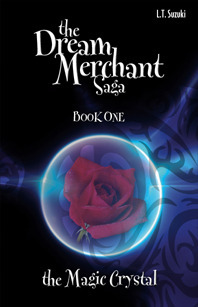 When I do write the fight scenes, the action level is intense, but it's usually over pretty quickly. However, for me, I tend to emphasize the trauma of being drawn into a fight and the roller-coaster ride of emotions as things escalate. The adrenaline, the panic, the fight-or-flight instinct kicking in is something that even if a person has never been in a physical altercation, the emotional side of it is something they can relate to. If they can relate to the feeling of fear, that rush of adrenalin, the shock of pain that becomes apparent only after the fighting is done, etc. the more impact this passage will have on them.
When I do write the fight scenes, the action level is intense, but it's usually over pretty quickly. However, for me, I tend to emphasize the trauma of being drawn into a fight and the roller-coaster ride of emotions as things escalate. The adrenaline, the panic, the fight-or-flight instinct kicking in is something that even if a person has never been in a physical altercation, the emotional side of it is something they can relate to. If they can relate to the feeling of fear, that rush of adrenalin, the shock of pain that becomes apparent only after the fighting is done, etc. the more impact this passage will have on them.
I think one of my best fight scenes is when the female protagonist goes to war for the first time and is momentarily frozen in panic. When it's over, she's on her knees puking her guts out and the shock sinks in that she is truly capable of taking a life. I've been told it was the emotional trauma she endured that really stuck in the reader's mind.
Absolutely – that sounds to me like a very realistic scene. Obviously, there's an awful lot more to all this than we've covered here, but it gives you a taste. I don't want to give everything away, or there'll be no demand for the ebook I'm working on!
Lorna, anything else you'd like to say on the subject in closing?
I'd like to recommend authors struggling with this bit of writing to try out a style of fighting their characters are familiar with. Many martial arts school give free introductory classes and a chance to sample a lesson can sometimes be enough to inspire the author to continue on training to learn more. Once they discover how easy it is to really do serious damage when they know what they are doing, it can be a real eye-opener. It can also open the door to writing fight scenes with a sense of realism. In my opinion, the best fight scenes are a perfect blend of action and emotional tension.
I couldn't agree more. I'd like to thank Lorna for taking time to chat to me today about this stuff. Best of luck with the book tour and your future writing!
Thank you so much for being such a great blog host, Alan! I'll catch you on Twitter and maybe when I return to Australia one year we can do a seminar on this subject. Now that would be fun!
You're on!
You can read excerpts, reviews and find out where to buy the books by checking out Lorna Suzuki's website at http://web.me.com/imagobooks
Follow Lorna on Twitter: @LornaSuzuki
Join Lorna for Day 5 of the blog tour when she discusses "The Challenges of Writing for a YA Audience" with Katrina Archer at her website: www.katrinaarcher.com/journal/
.
October 19, 2010
Grabbed by the throat or gently teased?
I've been thinking about the generally accepted premise that you need to grab readers in the first few lines of a story. I think for short fiction this is certainly true. You're usually trying to get noticed in a slush pile several feet deep and an editor needs to be interested right from the outset. You need to convince that editor that in your 5,000 words or so you're going to tell a clever, interesting and engaging story. There's very little room for leisure in the opening paragraphs of short fiction. But is it also true of novels?
As writers we're constantly told to make sure the opening pages of our novels are attention-grabbing. You need to get right into the action immediately, grab the reader and drag them along. Don't give an editor chance to pass up your book on the grounds that it's a slow starter. And so on.
But I wonder if that's true. If you're writing a stright up thriller, you expect some action right away. Bond films usually open with some crazy chase and action scene, for example, that's often nothing to do with the actual film. After another example of Bond's heroism and derring do, we're treated to a longer, slower exposition of the film we're actually here to see. The opening sequence is just re-establishing what Bond is all about.
In a thriller novel you'd expect much the same thing, in some form or another. In a mystery you'd expect a crime of some kind very early on to establish the credentials of the book and its protagonist. There are some styles that do evoke the need for a cracking opening and a fast pace. But is that always the case?
People often talk about things like Tolkien and Dickens and how they'd never get published these days as they're too slow and verbose. No editor would take a chance on them. Is that true? If you're reading something that you know is a long and complicated tale, would you really expect a tyre-screeching opening that leaves you breathless?
Let's take an example. China Mieville is a poster-boy for success in speculative fiction right now. He just won the Hugo for his novel The City & The City (shared with Paolo Bacigalupi's The Windup Girl). I recently read his massive book Perdido Street Station. I reviewed it here.
This book opens with a kind of prologue that is over three pages of first person narrative of a stranger arriving in a weird and interesting town, New Crobuzon. There's no action, no calamity, just pure exposition. A deliberate setting of the scene, taking the reader along with the narrator into the city where this story will be told.
Next we get the first proper chapter and it's more exposition of the city. Mieville is painting for us, with words to emulate the sights, sounds and smells of New Crobuzon so you can feel its grime on your skin. He wants the reader deep in the environment. He introduces characters and lifestyles. There's eight pages of this opening chapter and again, no action or massive event. No obvious hook beyond the desire to learn more about this amazing place we're experiencing. Chapter 2 is more of the same, more description, exposition. It's beautiful writing, it's incredibly evocative in creating a sense of place, but there's no action or intrigue to speak of until many, many pages in when Lin gets approached with a commission and Isaac is approached by a troubled garuda, our first person narrator from the opening prologue sequence.
This book is a perfect example of the kind of thing that many people tell you won't get published these days. Yet Mieville is hot property right now and winning more awards than he carry. That's mainly because he's an awesome writer. He also arrogantly ignores that old chestnut the "adverb rule". To brilliant effect. It's an example of good writing and good ideas drawing the reader in, regardless of "rules". It doesn't always take some mind-blowing event to ensure the start of a book holds the reader. How to get that more measured and relaxed opening past an editor, however, is a different matter. Perhaps it's something that comes slowly as a writer's craft develops and that writer's work entrances readers regardless of the subject or pace of the story. Good writing and an interesting premise will win out.
I'm always prepared to read on and discover a story slowly, especially in something that I know is long and will require a lot of my time. It doesn't need to grab me by the throat right from the start. I'm happy to be gently teased with interesting ideas and situations slowly developing if I feel like my investment will be rewarded with some quality storytelling.
I'm mainly thinking about these things at the moment as I'm trying to make the opening of my current work in progress a balance of interesting conflict and slow introduction, building to a more intense pace through the story. So I've started thinking about what makes the start of a book good enough to keep people reading.
What about you? Do you prefer a ball-tearing opening or are you open to slow, meandering starts? What keeps you reading past the first few paragraphs and what makes you put the book down and look for something else?
.
October 18, 2010
Realms Of Fantasy bows out
Another great magazine has been destroyed by a vicious economic climate and a lack of reader support. And it's really not the readers fault; it's just the times, they are a-changin'. It's such a shame that so many great magazines are sinking – but it's at least partly the cost of our new digital age. As we progress deeper and deeper online, with more people expecting more stuff for less outlay, the economic pressures of running an actual print magazine like Realms Of Fantasy become impossible.
You can read the full story here. As publisher Warren Lapine says in that article:
Ultimately, I believe Realms failed because of a terrible economic climate. When I purchased the magazine I did not believe that the worst economy since the Great Depression would actually get worse; that was a mistake.
I think that's true, but not the whole story. It's also another symptom of our progression away from traditional forms of print media. It's altogether possible that Realms could survive as an online and/or ebook publication, without the outlay required for physical copies and distribution. I think that's going to be the case for more and more fiction markets if they intend to survive. Places like Clarkesworld and Tor.com are seemingly very strong markets (you can never be certain in this game). While it's very sad to see the decline of another bastion of the printed speculative fiction range, it's really just part of the price we pay for moving into the future we've all been writing about.
As Robert Silverberg said at Worldcon recently, someone once introduced him with the words, "Robert Silverberg has made a career writing about the future. Now he's condemned to live in it."
Vale, Realms Of Fantasy. If anyone wants it, you can get it for a dollar.
(Hat tip, Lisa Hannett for this news.)
.
October 16, 2010
Reading several books at once
I don't mean simultaneously reading several books, maybe two at a time, one with each eye. That would be awesome in some ways, as I'd get to read a lot more, but I can also imagine it would just melt my brain. But, quite obviously, I mean having several different books on the go at once. I've always done it, but a conversation I had with someone the other day surprised me. They were astounded that I could do such a thing, their reasoning being that they couldn't imagine remembering two or more different stories at once.
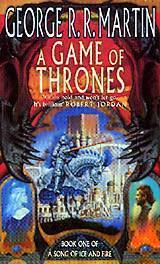 I don't get that. I'm currently reading George R R Martin's A Game Of Thrones in paperback. I mentioned before how I'd been putting off reading the series even though I had it because I was waiting for it to be finished. However, I'm reading it now before the HBO TV series starts, as I want to read before I watch. I'm also reading Peter Watts' Blindsight on my iPhone. Peter makes all his books available as free ebooks on his website, so I converted Blindsight to epub and I'm reading that. I'm also reading a non-fiction book, Mysterious Cornwall, by Rupert Matthews. I picked that up in hardcover on my recent trip to the UK and it's all about the various magical myths and legends of the West Country. Which, incidentally, are uniformly awesome. Great fodder for the imagination that I'll be co-opting into my own writing here and there, I'm sure.
I don't get that. I'm currently reading George R R Martin's A Game Of Thrones in paperback. I mentioned before how I'd been putting off reading the series even though I had it because I was waiting for it to be finished. However, I'm reading it now before the HBO TV series starts, as I want to read before I watch. I'm also reading Peter Watts' Blindsight on my iPhone. Peter makes all his books available as free ebooks on his website, so I converted Blindsight to epub and I'm reading that. I'm also reading a non-fiction book, Mysterious Cornwall, by Rupert Matthews. I picked that up in hardcover on my recent trip to the UK and it's all about the various magical myths and legends of the West Country. Which, incidentally, are uniformly awesome. Great fodder for the imagination that I'll be co-opting into my own writing here and there, I'm sure.
I don't have any trouble following these different books. Game Of Thrones is my current main read. When I sit down to read, that's the book I pick up. But I don't usually carry books around any more. When I'm out and about I'll read Blindsight, because it's right there on my phone and very handy to read anywhere. Sometimes I'll be at home and the urge to read one or the other will hit me, so I'll read whichever one I find myself in the mood for.
If I'm in the mood to read, but not either of those two, I'll pick up Mysterious Cornwall. Or if I have ten minutes to kill, I'll read a quick chapter from it as it's easier to read in bite-sized time gaps, being a book about stuff rather than a long story. It's always better, for me anyway, to read novels in bigger chunks.
Then again, I'll read three pages of a novel if I have five minutes spare and the story has me gripped. I used to walk to school reading a book, which is probably something that helped me develop the incredible peripheral vision skills I've since used successfully in martial arts. Books rule in so many ways.
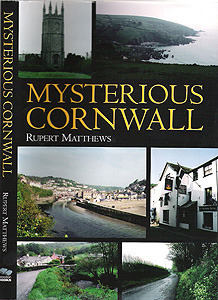 As well as these three books I'm reading, I'm also reading the latest couple of issues of Aurealis magazine and a couple of anthologies I picked up at Worldcon. I get the urge to read a short story and pick one of those up and enjoy a quick short yarn. None of these things overlap each other or strike me as difficult and this is where the conversation I mentioned at the start of this post surprised me.
As well as these three books I'm reading, I'm also reading the latest couple of issues of Aurealis magazine and a couple of anthologies I picked up at Worldcon. I get the urge to read a short story and pick one of those up and enjoy a quick short yarn. None of these things overlap each other or strike me as difficult and this is where the conversation I mentioned at the start of this post surprised me.
We watch TV shows mixed up all the time. You might watch Battlestar Galactica on a Monday night, Deadwood on a Tuesday and Fringe on a Wednesday. You don't get to the following Monday and complain that you can't remember what was happening in BSG because you watched Deadwood and it messed up your memory. For me, books are the same. Game Of Thrones and Blindsight are two very different stories. One does nothing to interrupt the other. Nor do the short stories or non-fiction I read interfere with either novel I currently have on the go.
Sometimes, when a book really gets under my skin, as many good books do, I'll forsake all other reading and just voraciously consume that one novel. That's always an indicator to me of a really good book. But even then, with one book making me put aside all other stuff and read it single-mindedly, if I'm out without that book and have time to read, I'll pull out my iPhone and read some of an ebook I'm currently into.
Truth is, I'm just addicted to reading. Which is a pretty healthy vice, really.
So what about you? Do you read lots of stuff at once or are you novel-monogamous? I'd love to hear your thoughts.
.
ThrillerCast episode 2 now available
The second episode of the new podcast I'm presenting with David Wood is up now. We discuss ebooks and how the publishing industry is changing, and a little bit about building an online profile as a writer.
I'm going out today to get a new mic as it's becoming quickly apparent that the one I have isn't really up to the job. Dave always sounds nice and clear and I sound like I'm recording from a dark hiding place in a cupboard. That needs rectifying.
The iTunes link is also available now, so you can subscribe that way if that's your preference. All the details on the ThrillerCast website here.
.



